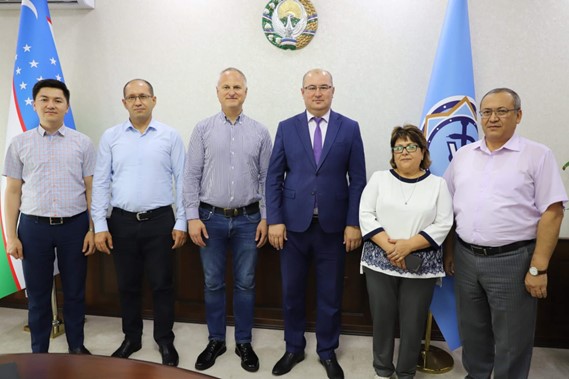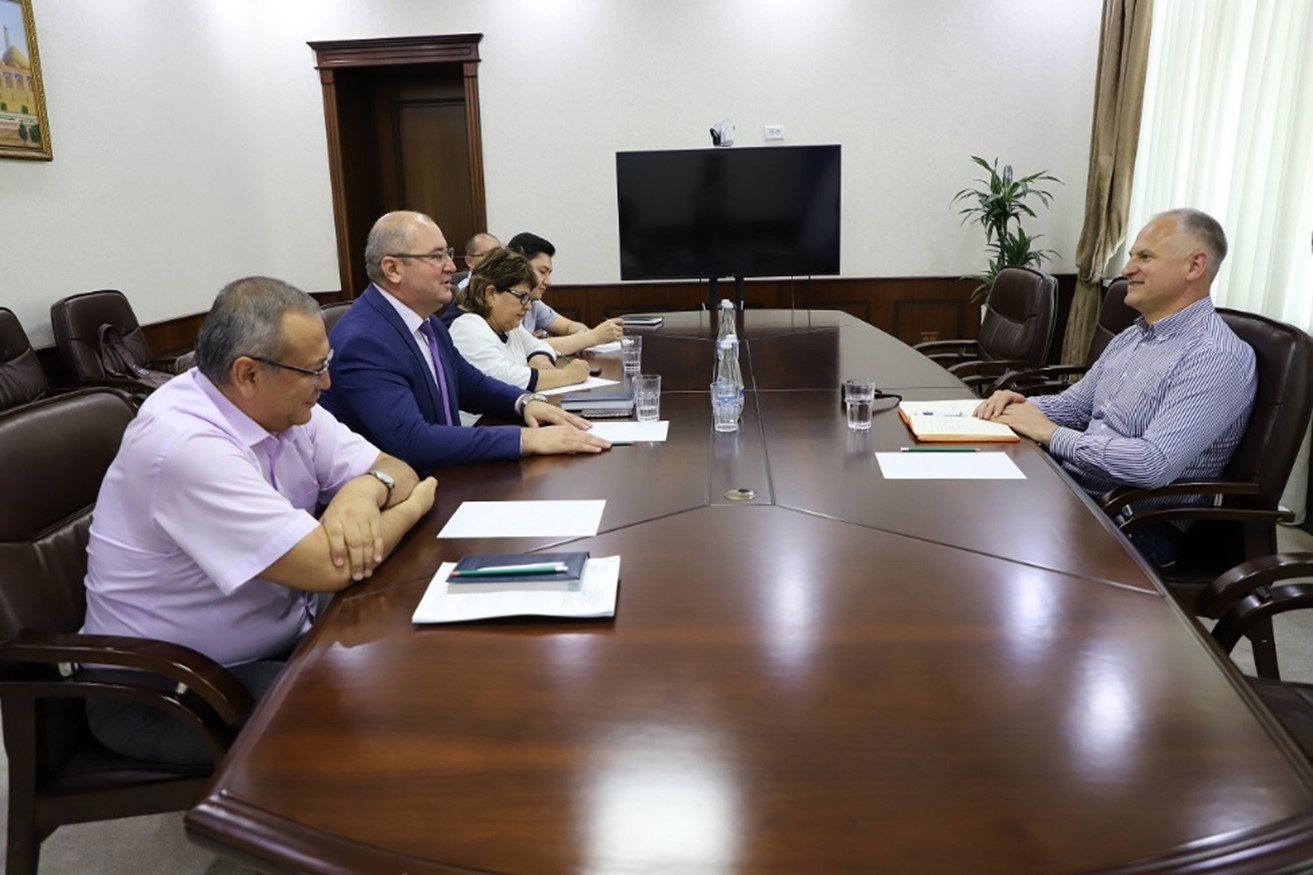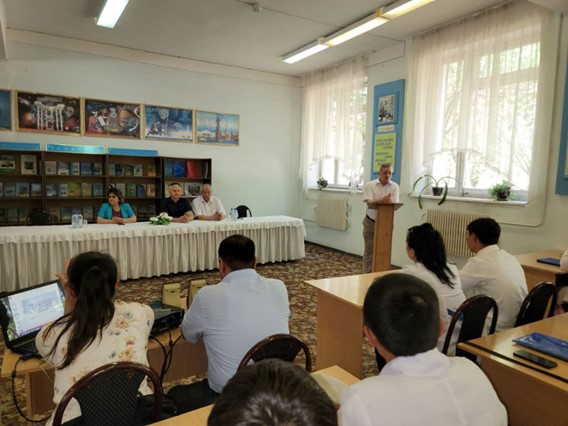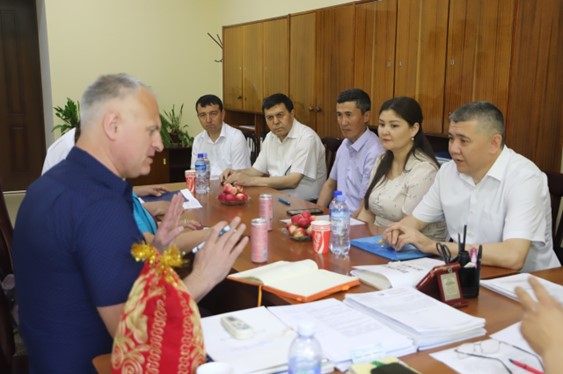Within the framework of our Regional Project on Veterinary Paraprofessionals (VPPs), the Veterinary Service of Uzbekistan has demonstrated a high interest in assessing and capacity-building its preparation of veterinary specialists. Invited by the Veterinary Service of Uzbekistan Dr. Dmitry Morozov, Regional Officer for WOAH VPPs project in Eastern Europe and Central Asia, held several meetings to discuss curriculum reforms in VPPs training institutions, implement a national workshop, further activities on veterinary legislation (VLSP) agreement, as well as the development a Veterinary Statutory Body (VSB). The Regional Officer visited a veterinary college that trains veterinary paraprofessionals, Samarkand University of Veterinary Medicine, Livestock and Biotechnology, Veterinary and Livestock Association, etc.
The partners were provided with information on the project activities and Guidelines on competencies and curricula for the training of veterinary paraprofessionals developed by the World Organisation for Animal Health.
The veterinary Service of Uzbekistan carried out various reforms in the agricultural sector in recent years and received significant investments from various. For example, a twinning project is being implemented between the universities of Samarkand and Minnesota, moreover, the Delegate expressed readiness to participate in the project on veterinary paraprofessionals.
Dr. Alisher Safarov, Head of the Veterinary and Livestock Association, founded in 2021 informed that the membership of veterinarians in it is currently voluntary. The strategy of the Association is to build up a register of all veterinarians and veterinary paraprofessionals on a compulsory basis, participate in profession regulation, education of vets and VPPs, and Continuing Professional Development, as well as recognition of veterinary and VPPs qualifications. It was declared that the current reform of the veterinary legislation has led to the simplification of veterinary practice for specialists. Thus, graduates with a veterinarian diploma might be engaging in veterinary practice without obtaining any license. Currently, veterinarians and paraprofessionals are registered neither at the central level of Veterinary Service nor in the Association, only in the local veterinary administrations.
“Our next step is to develop fully operational VSB in compliance with WOAH standards”
The educational establishment was founded in 1925 as Samarkand Agricultural Institute, in 2018 it was renamed Samarkand Veterinary Institute and in 2022 was reorganised into a university. There are 2 branches in Tashkent and Nukus. The University structure also incorporates 5 colleges training VPPs. Currently, 5876 students including VPPs study at the University.
The biggest faculty is Veterinary medicine, it accepts about 300 students receiving a state grant for education annually. Every year the State Committee of Veterinary and Livestock Development calculates the number of students studying free of charge to be admitted to the University based on the request from different stakeholders (state and private). Apart from veterinary medicine, there are also veterinary-related faculties, e.g., animal husbandry, food safety, and veterinary.
There are joint faculties with Vitebsk State Academy of Veterinary Medicine and Grodno State Agricultural University (Belarus) and Jelgava University (Latvia) where the study process is conducted on the following basis: 2 years in Uzbekistan and then 3 years abroad. Such graduates get double diplomas recognised in 2 countries. At the University, there is a Scientific Council on dissertations (thesis) for 4 specialties where the graduates receive Ph.D. degrees in veterinary sciences. Moreover, there is Continuing Professional Development program that the veterinary specialists must attend every 5 years.
Dr. Morozov held a discussion with the staff of the university on the harmonization of veterinary education and mentioned the issues of international accreditation of veterinary education by EAEVE and AVMA.
In Uzbekistan, there are 5 colleges within the structure of the university and 10 veterinary colleges that are under the authority of the Ministry of Education (MoE). In all 15 colleges, the curricula for veterinary medicine are the same but those under MoE additionally include other general education subjects. Graduates from these 10 colleges (under MoE) can be enrolled in the veterinary program at university on a general basis in the first year, same as applicants after high school. The college has good facilities and equipment for diagnostic of animal diseases. As a result, the administration of the college expressed its interest to participate in the VPPs project.
A shortage of veterinarians and VPPs in the region and employment opportunities for vets and VPPs were discussed during the mission to Bukhara. It was stated that in some cases VPPs also work in the position of a veterinarian. Currently, in this region, 468 vets and 280 VPPs are employed. Acting veterinary paraprofessionals can obtain a later veterinary degree on a distance learning basis at Samarkand University.
However, from 2024 such distance learning in veterinary education is going to be canceled. Uzbek specialists informed that VPPs are not involved in continued education, and see it as a problem that needs to be solved. The local college annually graduates 25 VPPs. Only VPPs working in the state veterinary service may participate in vaccination campaigns, private ones are involved only in the treatment of animals.
At the end of the mission, the Representative of WOAH and Uzbekistan partners underscored the importance of reforming veterinary legislation, strengthening veterinary education, and fostering an enabling environment for VPPs in the country.




